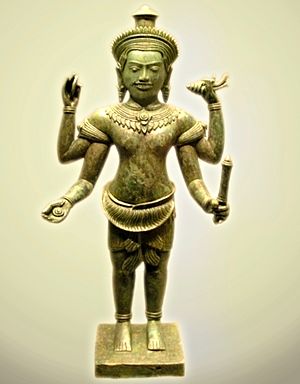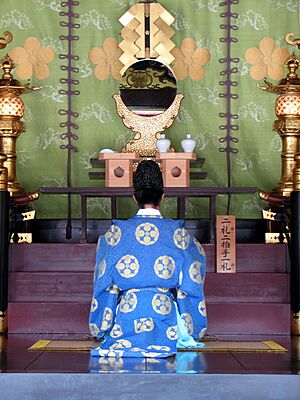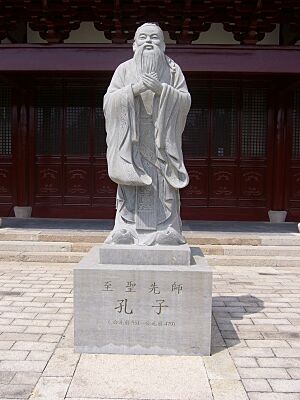Eastern religion facts for kids
Eastern religions is a name for many different ways of thinking and believing that started in places like India, China, Japan, and Southeast Asia. These religions are often grouped together because their ideas about life, the world, and how people should act are quite different from what are called Western religions, which began in other parts of the world.
Contents
What Are Eastern Religions?
Eastern religions are a big group of spiritual traditions and philosophies. They have shaped the cultures of billions of people for thousands of years. Unlike some religions that focus on one main god, many Eastern beliefs explore ideas like karma, reincarnation, and finding inner peace. They often teach that everything is connected.
Where Did They Start?
Most Eastern religions began in Asia.
- Hinduism and Buddhism started in India.
- Confucianism and Taoism came from China.
- Shinto is unique to Japan.
These ideas spread across Asia over many centuries. They influenced art, music, and daily life in these regions.
Main Eastern Religions
There are several major Eastern religions. Each has its own special teachings and practices.
Hinduism: A Religion of Many Gods?
Hinduism is one of the oldest religions in the world. It began in India thousands of years ago. Hindus believe in many gods and goddesses, but they see them as different forms of one ultimate reality called Brahman. Hindus believe in reincarnation, which means that after you die, your soul is reborn into a new body. Your actions in this life, called karma, affect your next life. Many Hindus also practice yoga and meditation to connect with the divine.

Buddhism: Finding Peace Within
Buddhism started in India around 2,500 years ago. It was founded by Siddhartha Gautama, who became known as the Buddha. The Buddha taught that suffering is part of life, but it can be overcome. Buddhists follow the Four Noble Truths and the Eightfold Path. These teachings help people find nirvana, a state of perfect peace and freedom from suffering. Buddhists often meditate and try to live a life of kindness and compassion.

Shinto: The Way of the Gods in Japan
Shinto is the traditional religion of Japan. It focuses on worshipping kami, which are spirits or gods found in nature. Kami can be in mountains, rivers, trees, or even in important people. Shinto emphasizes purity, cleanliness, and showing respect for nature. People visit Shinto shrines to pray and offer gifts to the kami. It's a very ancient religion that is deeply connected to Japanese culture.
Confucianism: Rules for a Good Life
Confucianism is not just a religion; it's also a system of ethical and philosophical ideas. It was developed by Confucius in China over 2,500 years ago. Confucianism teaches how to live a good life and create a peaceful society. It emphasizes respect for elders, family loyalty, and good manners. It also teaches the importance of education and acting with integrity. Confucian ideas have greatly influenced Chinese culture and government.
Taoism: Going with the Flow
Taoism is another ancient Chinese philosophy and religion. It was founded by a wise person named Laozi. Taoism teaches that people should live in harmony with the Tao, which means "the Way" or "the Path." It encourages simplicity, naturalness, and going with the flow of life. Taoists believe in balancing opposing forces, like yin and yang. They often practice meditation and martial arts like Tai Chi to connect with the Tao.
Other Important Beliefs
Many other spiritual traditions exist in Eastern countries. These include Jainism and Sikhism from India, and various folk religions found across Southeast Asia. These beliefs often blend with the major religions, creating rich and diverse spiritual landscapes.
How Are They Different from Western Religions?
Eastern religions often have different ideas compared to Western religions like Christianity, Islam, and Judaism.
- Western religions often focus on one God and a single holy book.
- Eastern religions might have many gods, or no gods at all, and often have many sacred texts.
- Concepts like karma and reincarnation are central to many Eastern beliefs but are not usually found in Western religions.
- Eastern religions often focus on finding inner peace and enlightenment in this life. Western religions often focus on salvation or an afterlife.
Why Are They Important Today?
Eastern religions continue to be very important in the world. They guide the lives of billions of people in Asia and beyond. Their teachings offer wisdom on how to live ethically, find peace, and understand the world around us. Many people, even those who don't follow these religions, find value in their ideas about mindfulness, compassion, and living in harmony with nature.
Images for kids
-
Distribution of Eastern religions today (yellow), as opposed to Abrahamic religions (purple).
-
OM, a sacred syllable and a quintessential symbol of Hinduism
-
Altar inside Liễu Hạnh Công Chúa Shrine in Hanoi.
See also
 In Spanish: Religiones orientales para niños
In Spanish: Religiones orientales para niños
 | Anna J. Cooper |
 | Mary McLeod Bethune |
 | Lillie Mae Bradford |







